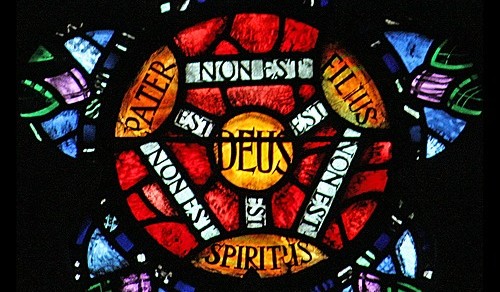We run our website the way we wished the whole internet worked: we provide high quality original content with no ads. We are funded solely by your direct support. Please consider supporting this project.

Does the Doctrine of the Trinity Matter?
Jesus reveals the greatest, most beautiful, and mysterious aspect of God when he, despite being himself God Incarnate, relates to God as his “Father” and refers to God as “the Holy Spirit.” There is, of course, only one God (1 Cor 8:6). Yet Jesus reveals that God somehow exists as Father, Son and Holy Spirit. We find God’s threefold personality revealed throughout the New Testament (e.g. 2 Cor 13:14, Matt 28:19, 1 Cor 12:4-6). It’s not just that God plays three “roles,” as some have taught. Rather, the New Testament reveals that God eternally exists as three distinct divine Persons. God is, in some sense, a loving divine community.
Throughout church history the threefold nature of God has been referred to as “the Trinity.” The word “Trinity” isn’t used in Scripture, but it’s a convenient way to summarize that New Testament’s teaching that God is Father, Son and Holy Spirit.
As with the Incarnation, it’s impossible for us to understand fully how this can be. The best we can do is come up with analogies.
For example, some have suggested the Trinity is mirrored in the threefold nature of the human psyche. This mental exercise illustrates this. Ask yourself: “When I think, who is talking and who is listening?” Notice that, in the very act of thinking, you’re manifesting a sort of plurality in your own mind. And notice that this plurality includes a relationship with yourself. You may love yourself (and thus approve of what you’re saying to yourself) or hate yourself (and thus disapprove of what you’re saying to yourself), but either way, you clearly have a relationship with yourself. So, the very act of thinking reveals that we are comprised of a self, a self-image and a relationship between the two. This plurality-amidst-unity is something like the Trinity.
An even better analogy is to imagine three people who are fully submitted to one another and are perfectly united in love and purpose. While each person in this perfect loving community would retain their distinct personhood, the heart and mind of each person would be completely surrendered to the other two. In a very real sense, therefore, this perfect community would experience, think and act as a single agent. This plurality-amidst-unity is again something like the way God is, according to the New Testament.
The revelation that God is an eternal, loving, divine community is the most foundational teaching of the Bible, for it reveals that God is, in his very eternal nature, perfect love. God is love (1 Jn 4:16). Love isn’t merely something God does; perfect love is what God eternally is.
It’s impossible to believe that “God is love” unless you conceive of God as an eternal community, for love is only possible between personal beings. If God existed alone by himself prior to the creation of the world, as Judaism and Islam teach, God could not be eternally loving within himself. God would need to create other personal agents in order to have someone to love. For Judaism and Islam, love can only be something God does, not the essence of who he eternally is. Among all the world religions, Christianity is the only one that presents a God whose very essence is love.
Since Jesus is the definitive revelation of God, we have to look to him to discover what God’s love is like—which is to say, to discover what God himself is like (1 Jn 3:16). And what we find when we do this is that the love that characterizes God’s essence is unfathomably beautiful and incomprehensibly self-sacrificial. Think about it. God crossed an infinite distance and paid the highest price imaginable to rescue a rebellious race of people who wanted nothing to do with him. In Jesus, the One who created all that is and who holds every molecule in existence (Heb 1:2) became a human being and died a hellish death out of love for a race of people who couldn’t have deserved it less!
This is the kind of love God is. The shockingly humble, other-oriented, submissive love that God expresses toward us while we were yet sinners (Rom 5:8) reflects the perfect, other-oriented love that God eternally is as Father, Son and Holy Spirit throughout eternity. This is antithetical to what fallen humans expect God to be like, and thus antithetical to most pictures of God or of gods we find people believing in throughout history. In sharp contrast to Zeus, Allah and (unfortunately) many people’s conception of Yahweh, the true God reveals his infinite greatness by becoming a small baby who grew up to be a crucified criminal. For the greatness of the true God is the greatness of shocking, unfathomable, incomprehensible, unsurpassable love. This is the Trinity.
Category: Q&A
Tags: God, God is Love, Jesus, Love, The Holy Spirit, Trinity
Topics: Trinity
Related Reading

Reflecting on the Lord’s Prayer
Jesus begins the instruction on prayer (Matthew 6:9-13) by telling his disciples to pray for the Father’s name to be “hallowed,” for his kingdom to come, and for his will to be established on earth as it is in heaven. He is, in effect, telling them to pray for the fulfillment of everything his ministry,…

Repent! … From the Sin of Religion
People often think that being Christian is about “being religious,” but loving others in the way that Christ instructs us is about as far removed from religion as anything could be. Religion, as I use the term, is a system of beliefs and behaviors one embraces as a means of getting life—whether this be feeling…

Kingdom Sightings: God and Guinness
Evan Leeson via Compfight Here’s a unique Kingdom initiative from one of our readers that we wanted to share with you. If you’re in Ann Arbor, check it out! Starting in January, one of the pastors at our church (Kevin Davis, of 242 Community Church in Ann Arbor, MI) will be starting a new initiative…

What Does the Holy Spirit Do?
The true God breaks into our deception-filled world to reveal himself to us in the person of his Son. In and of itself, however, this doesn’t lift the deception of the flesh from our hearts and eyes. We are yet dead in sin, blind, and lovers of “darkness rather than light” (Jn 3:19). As long…

Making God in Our Own Image
In this video, Greg introduces the idea of how we make God into our own image instead of allowing God to define himself through the revelation of Jesus. In an interview performed by Travis Reed from theworkofthepeople.com, we have a basic, quick introduction to a core element of Greg’s theology. This is a great piece to…

